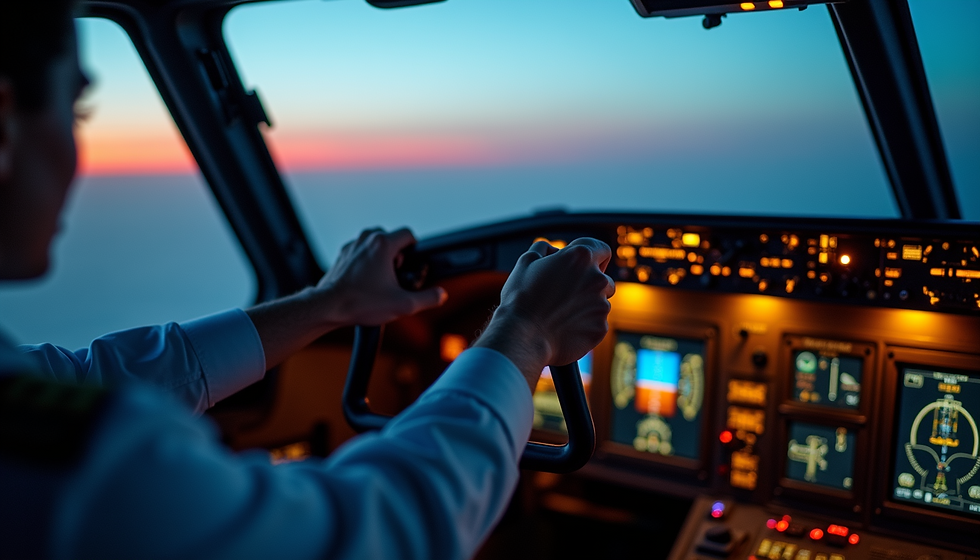How To Become an Airline Pilot - Step By Step
- wahab050677
- Apr 25, 2025
- 4 min read
Updated: May 1, 2025
Are you dreaming of soaring through the skies as a pilot? Airlanta is here to guide you on your journey from being an instructor to a pilot.

At Airlanta, the focus is on the invaluable expertise of flight instructors who play a crucial role in shaping aspiring pilots. The website aims to inspire and motivate individuals who have a passion for aviation by providing a comprehensive breakdown of the process. The journey begins with a thrilling "discovery flight" experience, where for a nominal fee, students get to take the controls of an aircraft with the guidance of a seasoned instructor. This hands-on experience serves as an introduction to the world of flying and can be a pivotal moment for those considering a career in aviation. For those ready to take the next step, obtaining a Private Pilot License is the goal. The flight instructor at Airlanta is dedicated to providing both flight and ground training to ensure students are well-prepared for the rigorous test ahead. With three years of flying experience under their belt, the flight instructor at Airlanta is living out their dream of one day becoming an airline pilot. The most fulfilling aspect of their journey thus far has been the opportunity to mentor and guide aspiring pilots as they navigate the challenges and excitement of pursuing a career in aviation. Embarking on the path to become a pilot is a thrilling and rewarding journey, and at Airlanta, you'll find the support and guidance you need every step of the way. Let your aviation dreams take flight with Airlanta as your trusted companion in the skies. So, are you ready to spread your wings and soar towards a career in aviation? Join us at Airlanta and let's make your pilot dreams a reality.
Becoming a Pilot: From Zero Experience to First Officer
Embarking on the journey to become a pilot is an exhilarating and fulfilling experience. At Airlanta, aspiring pilots receive comprehensive support and guidance throughout each stage of their training. Below is a detailed breakdown of the process and the various licenses required to progress from a novice to a first officer at an airline.
1. Discovery Flight
The journey begins with a thrilling "discovery flight." This experience allows students to take the controls of an aircraft under the supervision of a seasoned instructor. For a nominal fee, this hands-on introduction serves as a pivotal moment for those considering a career in aviation, igniting their passion for flying.
2. Private Pilot License (PPL)
The first major milestone is obtaining the Private Pilot License (PPL). This license allows pilots to fly for personal use and not for compensation.
Requirements for PPL:
Minimum age of 17 years
At least 40 hours of flight time, including training and solo flights
Pass a medical examination
Complete a written knowledge test
Pass a practical flight test with an examiner
3. Instrument Rating (IR)
After obtaining the PPL, the next step is to earn an Instrument Rating (IR). This rating allows pilots to fly under instrument flight rules (IFR), which is essential for flying in various weather conditions.
Requirements for IR:
Hold a PPL
Complete a minimum of 40 hours of instrument flight training
Pass a written knowledge test
Pass a practical flight test
4. Commercial Pilot License (CPL)
The Commercial Pilot License (CPL) is the next significant step, allowing pilots to be compensated for their flying services.
Requirements for CPL:
Minimum age of 18 years
Hold an IR
Complete at least 250 hours of flight time
Pass a medical examination
Complete a written knowledge test
Pass a practical flight test
5. Multi-Engine Rating (ME)
To fly larger aircraft, pilots must obtain a Multi-Engine Rating (ME). This rating allows them to operate aircraft with more than one engine.
Requirements for ME:
Hold a CPL
Complete training in a multi-engine aircraft
Pass a practical flight test in a multi-engine aircraft
6. Certified Flight Instructor & Certified Flight Instructor Instrument (CFI & CFII)
Becoming a Certified Flight Instructor (CFI & CFII) allows pilots to teach others how to fly, providing valuable experience and flight hours.
Requirements for CFI & CFII:
Hold a CPL
Complete ground and flight training for instructing
Pass a written knowledge test
Pass a practical flight test
7. Multi-Engine Instructor (MEI)
The Multi-Engine Instructor (MEI) rating enables instructors to teach students in multi-engine aircraft.
Requirements for MEI:
Hold a CFI
Complete training in multi-engine flight instruction
Pass a practical flight test in a multi-engine aircraft
8. First Officer at an Airline
Once all necessary licenses and ratings are obtained, pilots can apply for positions as a First Officer at an airline. This role involves flying as a co-pilot on commercial flights and gaining valuable experience in a professional environment.
Conclusion
At Airlanta, the expertise of flight instructors plays a crucial role in shaping the careers of aspiring pilots. With a dedicated team ready to mentor and guide, students are well-prepared to navigate the challenges of aviation training. The journey from a discovery flight to becoming a first officer is filled with excitement and opportunities, making it a rewarding path for those passionate about flying. Are you ready to spread your wings and soar towards a career in aviation? Join us at Airlanta, and let’s make your pilot dreams a reality!



Comments